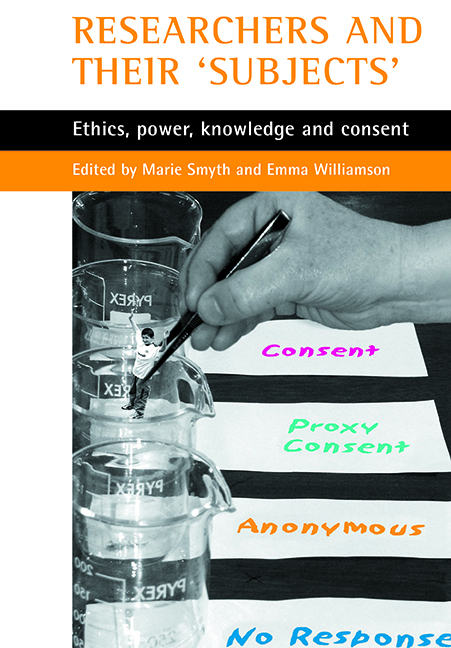eleven - Domestic violence and research ethics
Published online by Cambridge University Press: 20 January 2022
Summary
Introduction
The Domestic Violence Research Group (DVRG) in the School for Policy Studies at the University of Bristol – re-launched as the Violence Against Women Research Group in September 2004 – conducts national, international and local studies of domestic violence and of other forms of violence against women. It also offers wide-ranging consultancy, teaching and training on the issue and works, broadly speaking, from an activist perspective. The group works alongside Women’s Aid, the principal national organisation working with abused women and their children, and has links throughout the activist movement, in both this country and abroad. Our principles derive from our long history of involvement with feminism and from an understanding of violence against women as a manifestation of inequality in society between men and women.
This chapter evolved from an edited Round Table discussion about the ethics and sensitivities involved in researching domestic violence and other forms of violence against women with a group of researchers associated with the DVRG. We met together and held tape-recorded discussions about the relevant research issues, chosen by the facilitator in consultation with other contributors, and our views about the relationships we have with research participants and research governance. The resulting piece of writing was edited collectively in a lengthy process to which all participants contributed, and which included detailed individual editing, circulation of drafts, group editing, discussions and further meetings. The result is therefore a form of collaborative writing, although individual participants have maintained their own voices where sections of the discussion are included.
We chose this method of collaboration in order to illustrate the importance of researchers collectively discussing and identifying ethical dilemmas that emerge in the course of the research process. It was also relevant that all of the researchers involved in this chapter research around what could be deemed a ‘sensitive’ research area. Research about violence against women raises additional ethical concerns relating to confidentiality, informed consent, and notions of risk and/or harm. It is these key issues, in addition to the context of power within the research relationship, which form the content of this chapter.
The discussion also offers an inter-disciplinary perspective. The authors of the chapter have conducted research in the areas of health, education, housing, mental health services, the voluntary sector, social services, and in relation to perpetrators of abuse.
- Type
- Chapter
- Information
- Researchers and their 'Subjects'Ethics, Power, Knowledge and Consent, pp. 195 - 210Publisher: Bristol University PressPrint publication year: 2004
- 3
- Cited by



